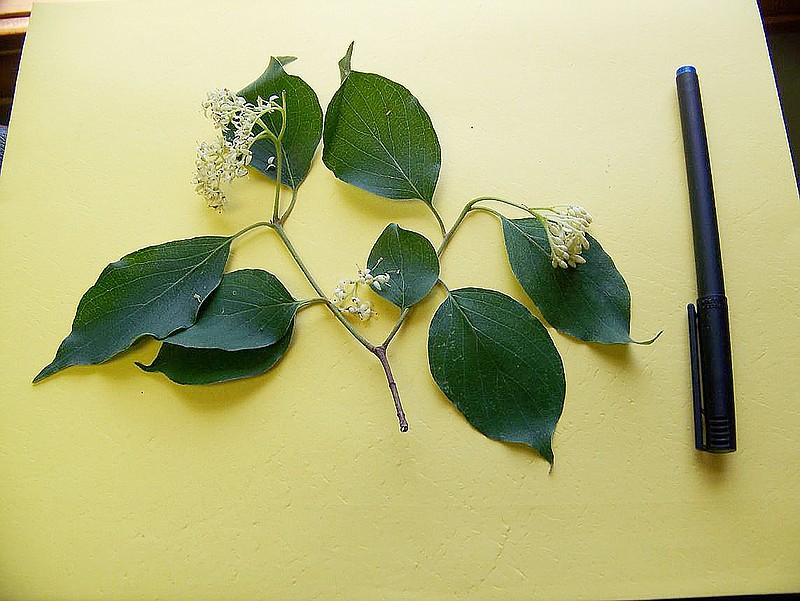Q. What is this bush? (see photo)
A. It is commonly referred to as pagoda dogwood and can also be a small tree. The species is Cornus alternifolia, identifiable by the alternating leaves on the stem. Most dogwoods have opposite leaves, so a nickname is alternate-leafed dogwood. The Missouri Botanical Garden reports it exists across a large area of eastern North America, regionally from Minnesota to northern Arkansas. It's native to a range of forest habitats, from dry to wetter areas and from full sun to shade. In our hotter Missouri afternoons, shade is beneficial. It grows best in acidic, organically rich and well-drained soils.
Q. When should I stop harvesting asparagus? I've heard conflicting opinions. And do you have any tips on weed control?
A. I often say around Memorial Day weekend or when you start harvesting cauliflower. However, MU Extension's publication "Growing Asparagus in Missouri" is more specific, saying "normal harvest runs from about April 14 to June 5." A vigorous asparagus patch can be harvested for up to eight weeks. Fertilizing with nitrogen each spring will help the patch retain its vigor.
After the final harvest, remove all weeds and mulch with 1-2 inches of wood chips, shredded bark or similar. A tip for the weeding is to be diligent with the final harvest, cutting all the spears at soil level and removing any scrappy little fronds. Then spray the remaining weeds and bed area with glyphosate (also know as Roundup). Mulch the following day. Those weeds will die, the mulch will suppress new weeds, and the fronds will poke through, leaf out and shade the bed, thereby further reducing weed growth.
Q. My tomato plants seem to be getting a disease on the leaves. It has happened before, and I think it is a fungus. It starts at the base and works its way up. What should I do to slow or stop it?
A. The description you have given matches "Early Blight," but to be certain, we'd need to get a physical sample or two to three good photos. Treating the plants with a fungicide will slow the spread. I recommend the active ingredient chlorothalonil (Daconil's Fungicide Concentrate is generally available at many garden centers). Apply it according to the label's directions. When you mix it with water to spray on, consider adding some "spreader sticker" to improve its adherence and effectiveness.
Mulching under the plants with straw or similar (e.g. grass clippings) will also help. Pruning off the damaged or dead leaves does not help, as leaves above those that look healthy may already be infected. Cleaning off the bottom foot or so of foliage can help with airflow, but any higher isn't likely to be beneficial.
Q. What can I spray on blackberries to kill or control Japanese beetles?
A. The most convenient to use is Ortho Flower Fruit & Vegetable Insect Killer. One only needs to wait one day after using to harvest (preharvest interval). The label says to spray when pest first appears and to reapply every seven days until control is attained. Sevin is also labeled and is widely regarded as most effective on Japanese beetles. However, one needs to wait for seven days after applying it to harvest the fruit.
Our extension center is having a class on Japanese beetles from 4-6 p.m. Monday. Cost is $10. Contact our office if you are interested or have questions.
The Central Missouri Master Gardeners are a volunteer group of 191 members, 122 of whom are Cole County residents, who maintain 11 beautification sites in Cole County, which are nonprofits or public entities. Master Gardeners must complete a basic training program of at least 30 hours of horticultural training, as well as 30 hours of volunteer service. The Missouri Master Gardener program is supported by the University of Missouri Extension.
Have a gardening question of your own? Call 573-634-2824 or stop by the Cole County Extension Center in Jefferson City at 2436 Tanner Bridge Road.

